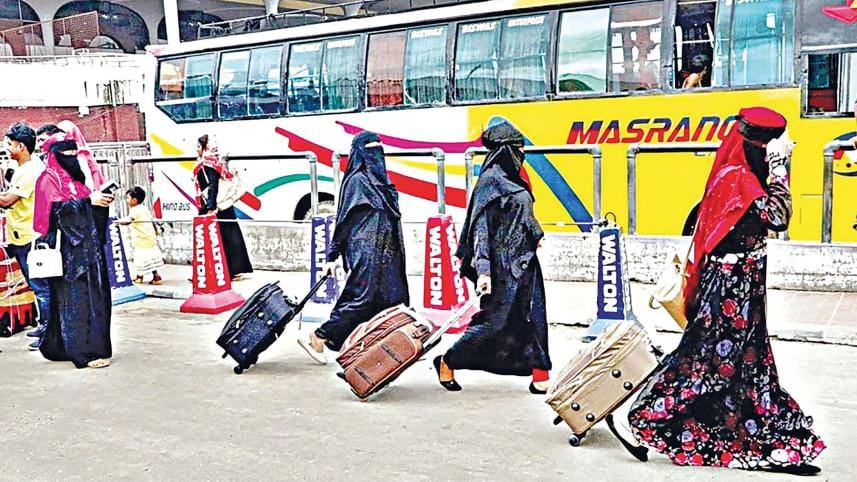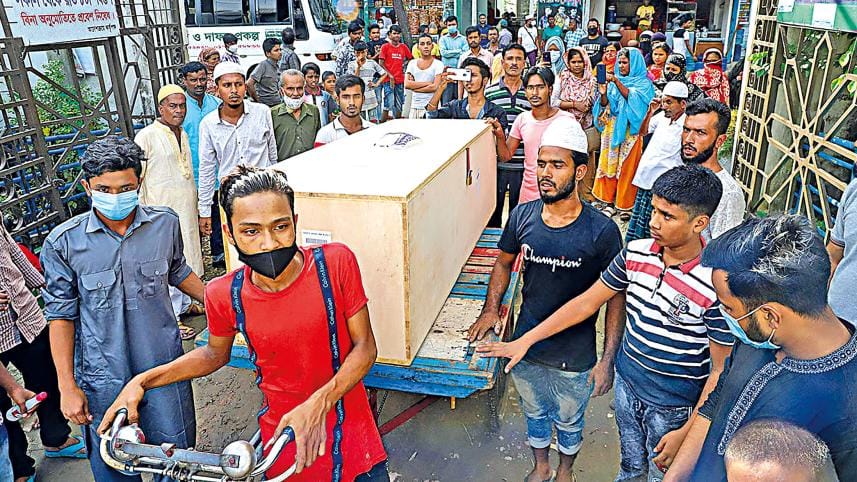Uncovering the silent deaths of migrant women

In the shadows of booming remittance flows and the quiet resilience of Bangladesh's labour diaspora, a disturbing reality persists: numerous Bangladeshi female migrant workers, particularly those employed as domestic help in Gulf countries, are returning home in coffins. Officially labelled as suicides or natural deaths, many of these cases conceal a far darker truth.
Marina Sultana, Director of Programmes at the Refugee and Migratory Movements Research Unit (RMMRU), has been tracking these patterns for years. "Most Bangladeshi female migrants work as domestic workers in Gulf countries," she explains. "A worrying trend has emerged: the rising number of deaths, often obscured or misclassified on official death certificates."
Two harrowing cases reveal the gravity of the crisis. In one, a young woman's death was ruled a suicide, yet her family insists otherwise. They recall speaking to her just a day before her death; she had described being scalded with hot water by her employer, an injury they believe led to her death. In another case, the cause was reported as a rooftop fall, but the family suspects foul play.
Shakirul Islam, Founder and Chairperson of Ovibashi Karmi Unnayan Program (OKUP), says families of deceased workers rarely accept the official explanations. "Many believe these deaths result from severe abuse," he says. "Some allege the victims were thrown from rooftops after enduring prolonged torture." Shakirul shares the account of a survivor who, after a brutal assault, was left bleeding without medical help. She survived, but her story underscores the isolation and vulnerability of domestic workers abroad.
The death certificates, he points out, are often "superficial, if not misleading". They rarely reflect the abuse, psychological trauma, or dire conditions that may have contributed to these deaths.
Piyara Begum, who worked as a domestic worker in Saudi Arabia for four years, recounts her ordeal: "I suffered chronic head and stomach issues, but there was no proper medical care," she says. "I received no support from any Bangladeshi official." Her health deteriorated, and when she pleaded to return home, her employer withheld four months' salary. Eventually, with the help of a local NGO, she returned home and received treatment.
Her son, too, returned from Oman—physically abused, tortured, and penniless.

Mim Akter, another returnee from Saudi Arabia, faced similar exploitation. "A dalal (middleman) charged me 5,000 BDT. When I arrived, no one received me," she says. Forced to work long hours, her employer only provided lunch, leaving her to fend for the rest. One day, a brick fell on her chest, causing a serious injury. She paid 40,000 BDT for treatment herself. Her employer delayed her return for six months and seized assets worth nearly 300,000 BDT.
"I had to pay for my own return," Mim says. "Now I am trying to lodge a complaint through OKUP."
Shariful Islam, Deputy Director of the Wage Earners' Welfare Board (WEWB), says, "At least 15 million Bangladeshi migrants are actively contributing to the national economy. But the deaths of female migrant workers highlight the link between their vulnerability at home and their fate abroad." He acknowledges that stress and exploitation in the workplace may be contributing factors.
"We have not received any formal complaints from the families of the deceased," Shariful adds, "but if complaints are made, we are committed to conducting thorough investigations."
Yet the absence of complaints does not mean the absence of abuse. Families often lack legal support, awareness, or the courage to seek justice.
According to BRAC, based on government data, 714 women returned in coffins from Middle Eastern countries between 2016 and 2022. The yearly breakdown is as follows: 52 women in 2016; 94 in 2017; 110 in 2018; 139 in 2019; 80 in 2020; 121 in 2021; and 117 in 2022. Behind each coffin lies an untold story, an unanswered question, and a denial of justice. It is time to demand more—both from Bangladesh and from host countries. Every life lost without clarity and accountability is not just a statistic; it is a stain on our collective conscience.
"We need a well-informed migration strategy to save lives," urges Marina Sultana of RMMRU. "Food habits, language barriers, poor accommodation, long work hours, and social isolation all contribute to daily hardship, sometimes with fatal consequences. Bangladesh should take inspiration from Hong Kong by improving residential training, including modules on workers' rights, behavioural expectations, and cultural orientation."
She also highlights how both the government and returnees often hide cases of abuse due to diplomatic caution or social stigma. "But we, as human rights advocates, have the testimonies and evidence to break this silence."
Bangladesh must demand clarity, accountability, and dignity—not only for those who return but for those who never get the chance.
Mujib Rahman is a journalist at The Daily Star.



 For all latest news, follow The Daily Star's Google News channel.
For all latest news, follow The Daily Star's Google News channel.
Comments